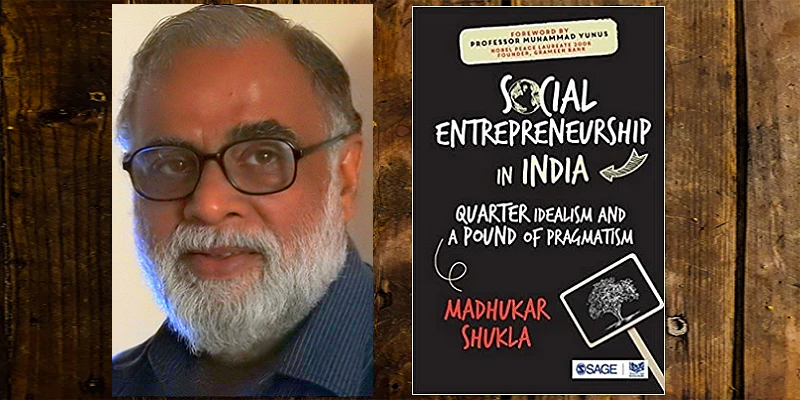Madhukar Shukla is a Professor of Strategic Management at XLRI Jamshedpur and serves on the Board of School of Management and Labour Studies, TISS. He holds a Master’s degree in Psychology from Lucknow University and a PhD from IIT-Kanpur. He is the author of Social Entrepreneurship in India: Quarter Idealism and a Pound of Pragmatism (see my book review here).
The nine chapters in the 256-page book are thoroughly researched, and draw on 120 organisational examples and 180 references. The book is a must-read for aspiring social entrepreneurs, innovators, academics, policymakers, and impact investors.
Madhukar is also a speaker at the sixth annual Bangalore Business Literature Festival (BBLF), to be held online on October 30-31. YourStory is the media partner for BBLF; see our preview article here, as well as coverage of earlier editions of the festival in 2019, 2018, 2017, 2016, and 2015.
See also YourStory’s Book Review section with reviews of over 270 titles on creativity, entrepreneurship, innovation, social enterprise, and digital transformation.
In this chat with YourStory, Madhukar talks about the journey of a social entrepreneur, problem-solving, and the role of academia.
Edited excerpts from the interview:
YourStory [YS]: What are some of the outstanding examples you have come across of resilience and initiatives by social entrepreneurs during the COVID-19 pandemic?
Madhukar Shukla [MS]: Oh, there are too many to enumerate! The pandemic, and the subsequent abrupt lockdown, create an unprecedented humanitarian crisis which has still not ended. Not only it created the migrant crisis, but it also left many people, who were living on the fringes of society, without any means of subsistence.
In many ways, it was also a watershed event in the civil society and social entrepreneurial space – particularly for many social entrepreneurs, who, with reference to the typology in my book, I would describe as ‘Public Goods Providers.’
For instance, many of the established social ventures, such as Goonj, Aajeevika Bureau, and Hasiru Dala, which were already working in the space of relief and with migrant informal sector workers, spurred up their efforts to meet this challenge. There were also many other innovative initiatives from other ventures.
For example, Haqdarshak, which supports legal entitlements of the unorganised sector workers, created a campaign to track and provide aid to the migrant and informal sector workers. Similarly, Sustainable Green Initiative created an initiative to provide livelihoods to rural households by providing them saplings of fruit-bearing trees.
At a smaller and localised level, there were many initiatives taken by individuals, citizen groups, and small organisations such as helping the migrants in their journey back home, providing basic subsistence necessities like rations and sanitary pads to marginalised communities, and so on.
Why I used the term ‘watershed’ is because what I see is that many of these efforts, which started as a response to a crisis, also brought in new talent in the sector, and many are now evolving as viable and sustainable social ventures.
For example, many of these individuals who started at that time to provide relief to communities and migrants have now started working on issues such as providing livelihoods, skilling, micro-enterprise development, and community building with the same segments. It will be interesting to see how the shock of pandemic and lockdown may inadvertently bring more talent and new models into the social entrepreneurship sector.
YS: How was your book received? What were some of the responses and reactions you got?
MS: Though I don’t know the exact number of copies sold, I think the book has done reasonably well. For the first few months after the launch, it was among the top five “hot new releases” (which I think is determined by the sales of books within the last six months or so) on Amazon.
However, the purpose of writing the book was not the sales, but to document and share my learning about the sector, since there was no India-specific text on social entrepreneurship. I was happy that many practitioners, including some recognised social entrepreneurs, read the book and found it a relevant contribution to the field.
Many young ones also wrote to me, saying they found many parts of the book insightful for the work they are doing. I also feel satisfied that some of the institutes and universities which teach social entrepreneurship have started using it as a part of the course.
YS: What is your next book going to be about?
MS: Frankly, I don’t know. I have never written a book with the aim of writing a book. It has always evolved from some area of interest that I had been pursuing. When I have enough material to document and share, it becomes a book.
YS: What is your current field of research in entrepreneurship?
MS: Frankly, I am really not a researcher in the academic sense. Social entrepreneurship is an area of interest, and I try to keep up with trends in the sector. If some of them make sense in the larger landscape, I also document them.
Currently, I am quite fascinated with small localised change initiatives that are sustainable. Mostly, these ventures are so localised and small that they are rarely studied or documented. But, there is much to learn from how they use local knowledge and meager local resources to create a sustainable social impact in the community.
YS: How big a role do academics play in social entrepreneurship? Can entrepreneurship really be formally taught?
MS: Academics can and does play a useful role in the social entrepreneurship field by identifying and documenting trends, principles, and models from practice. These can help the entrepreneurs to make more informed decisions.
However, I think, “Can entrepreneurship be formally taught?” is an unfair question. The same question applies to any field of practice. I mean, for example, engineering can also be formally taught, only if the learner is temperamentally and intellectually inclined towards becoming an engineer.
The same applies to the field of entrepreneurship or social entrepreneurship. If a person is inclined towards becoming an entrepreneur, he/she can derive a lot of value from academic teaching and research.
YS: What are the typical challenges social entrepreneurs face as they scale up their organisations? How can these challenges be addressed?
MS: Having succeeded in one market or region, it is natural for social entrepreneurs to think of scaling up into other regions and markets. However, when organisations scale-up and try to replicate the model which has succeeded in one place, they have to deal with a new set of problems and challenges. They need to consider and plan for three critical challenges of scaling up.
One, scaling up into other locations also increases the complexity of operations. For instance, it may require new systems and processes to manage and coordinate multi-locational operations, new reporting and performance management systems, organisational capabilities to manage more complex logistics, and so on. Success or failure of scaling up will depend on the organisational and managerial capacity to deal with such issues.
Secondly, scaling up would also need hiring new talent to manage increasingly complex operations of the venture. The key challenge for the social entrepreneur would be to find and onboard people who not only have the relevant technical skills but also have similar values that the organisation holds.
Lastly, there is the danger of ‘mission drift.’ Scaling up requires a large financial outlay. Social ventures rarely have enough internal accruals to finance such expansion and have to rely on external grants or investments. Such funding, however, often comes with conditions that are funders’ priorities and can cause the social entrepreneur to change the venture’s model and focus.
YS: How should innovators strike that delicate balance between ‘Stick to your vision’ and ‘Adapt to a changed world’?
MS: I don’t think there is really a contradiction between the two aims. Vision is about the purpose: why does the venture exist, what problem does it aim to solve, and so on. In fact, if the vision is thoughtfully articulated, it evolves organically to embrace the changes in the emerging environment. The problem of adapting to change arises when the vision is narrowly defined around a specific model, technology, or methodology.
For instance, the vision of ‘eliminating poverty in the communities we serve’ is resilient to changing circumstances. But, limiting this vision to ‘providing micro-credit to all poor in the community’ is likely to make it misaligned if there are changes in the regulatory environment, or if despite access to micro-credit, the community is unable to move out of poverty due to other reasons such as lack of productive skills or access to markets.
YS: Is there such a thing as the ‘ideal age’ for a social entrepreneur, or can the startup bug strike you at any time?
MS: I don’t think there is an ‘ideal age’ for becoming a social entrepreneur. I have known both youngsters who made this choice right in the beginning, and also people who made a switch to this field in their mid- or late-career.
However, I think it may be easier to make this choice at the beginning of one’s career since there are less baggage and lesser liabilities at that time.
YS: How should founders evaluate weak signals and anecdotal evidence, which seem to contradict quantitative market trends?
MS: Actually, both formal quantitative market research and information from weak anecdotal signals are useful for the entrepreneur. However, they serve very different purposes.
Quantitative research provides information about trends in the markets and about needs that are already defined and discovered. It is useful if the aim of the entrepreneur is to grow in the same market, serving the same or similar needs.
Weak signals, on the other hand, help in identifying latent needs and markets which cannot be discovered by formal market research. In fact, the studies on entrepreneurs show that they typically gain insights into new opportunities from qualitative sources such as informal conversations, interactions with potential customers, a chance event, or even a random article which they read.
If the entrepreneur is looking for new opportunities and markets, s/he should be more cognizant of the weak and anecdotal signals.

Madhukar Shukla, Author of ‘Social Entrepreneurship in India’
YS: What are the Top Three contributions digital technology is making to social entrepreneurs - and what are the key challenges it poses as well?
MS: Over the last decade or so, with the increasing affordability of and access to digital technology, it has become a part of the models that are used by many social entrepreneurs. In my experience, three important ways in which it helps creating social change are Access, Aggregation, and Democratisation. Let me explain.
Firstly, Access. A large number of social problems in India revolve around access to basic services such as education, healthcare, entitlement, market information and access, and so on. The main reason for this is that the users of such access live in places that are remote and not easily accessible. Innovative use of digital technologies can solve this last-mile problem.
Secondly, a large proportion of producers and service providers in our country, such as the vendors, artisans, small and marginal farmers, and repairmen, are dispersed and lack efficient access to markets and customers. Since digital technology connects, it also provides an opportunity to Aggregate them, and create an ‘Uber’ kind of offering, which is beneficial for both the providers and the customers. There are many social ventures which use digital technology to aggregate rural artisans, urban repairmen, or even rickshaw pullers, to provide them easy and equitable access to customers.
Lastly, access to digital technology empowers since it places the agency in the hands of the user. There are many examples of such a Democratisation of power. For example, it allows a rural artisan to by-pass the intermediaries, enables a farming community to share their best practices through self-made videos, assists urban service providers (repairmen, household helps, vendors) to directly connect and negotiate with the customers, and so on.
By placing the digital technologies in the hands of these communities, social entrepreneurs facilitate adjustments in the power imbalances in society.
Edited by Suman Singh
Link : https://yourstory.com/2020/10/madhukar-shukla-social-entrepreneurship
Author :- Madanmohan Rao ( )
October 25, 2020 at 07:25AM
YourStory


